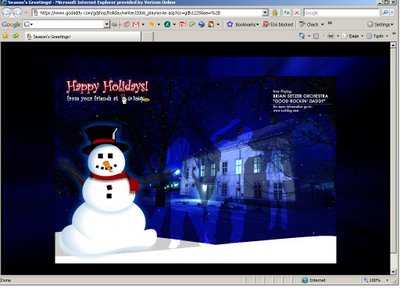Saturday, December 30, 2006
Some of us older folks remember when television was free. Then the powers that be (read rich corporations) brought out "cable" television and sold the idea to everyone on the premise that if you paid a subscription, you wouldn't be bothered with all those stinkin commercials. Sounded fair enough right? So we bot into it. Of course here we sit now paying for cable WITH commercials.
Now comes the attack on the neutrality of the internet. The rich corporations now want to provide high speed content only from those that agree to pay them a special fee. Those not willing to pay the piper, will be stuck in the slow lane, and possibly eliminated if Comcast et al get their way. Heck they think they own the net anyway. Watch the video to get the message, and then go to www.savetheinternet.com and sign the petition.
Monday, December 25, 2006
Just a funny little clip that I think reflects a bit of the current feelings being experienced daily by domainers attempting to expand their domain portfolios into foreign language keywords and/or foreign country code top level domains (ccTLDs)
Saturday, December 23, 2006

Many domainers, frustrated in the search for keyword strings in .com, have instead invested in foreign domains in top level extensions (TLDs) and/or country code top level domains (ccTLDs). I do see the future potential for this strategy and have even dipped my own toe in the water sometime back with a couple like Motocicletas.org (spanish for Motorcycles).
The risk of course is messing up on the translations from english to whatever and finding that Bablefish or Google language tools just might not be cutting it. Imagine the horror that these brands experienced upon launching some very expensive advertising campaigns without the necessary translation due diligence.
Here's a few examples where ad campaigns went astray.
The Coca-Cola name in China was first read as "Kekoukela", meaning "Bite the Wax Tadpole". General Motors had a fiasco in trying to market the Nova car in Central and South America. "No va" in Spanish means, "It Doesn't Go". Pepsi's "Come Alive With the Pepsi Generation" translated into "Pepsi Brings Your Ancestors Back From the Grave" in Chinese. Scandinavian vacuum manufacturer Electrolux used the following in an American campaign: "Nothing Sucks like an Electrolux." Clairol introduced the "Mist Stick," a curling iron, into Germany only to find out that "mist" is slang for manure. Not too many people had use for the "Manure Stick." Coors put its slogan, "Turn It Loose," into Spanish, where it was read as "Suffer From Diarrhea." Last but not least, when American Airlines wanted to advertise its new leather first class seats in the Mexican market, it translated its "Fly In Leather" campaign literally, which meant "Fly Naked" (vuela en cuero) in Spanish.
I won't be regging anymore foreign language domains without the review of a professional translator.
Thursday, December 21, 2006
 I guess I'm not done messing with Parsons at GoDaddy yet. I really think he was trying to be nice by sending me one of those email holiday cards. Problem is that I think GoDaddy took the "spirit" of the season literally and included Zombies walking around and dancing. Then again maybe they were trying to save money by covering both Halloween and Christmas with one effort. Don't you think they should have the music playing from Michael Jackson's "Thriller" instead? Anyway, if you want to experience the "joy" first hand, here's a link to the card.
I guess I'm not done messing with Parsons at GoDaddy yet. I really think he was trying to be nice by sending me one of those email holiday cards. Problem is that I think GoDaddy took the "spirit" of the season literally and included Zombies walking around and dancing. Then again maybe they were trying to save money by covering both Halloween and Christmas with one effort. Don't you think they should have the music playing from Michael Jackson's "Thriller" instead? Anyway, if you want to experience the "joy" first hand, here's a link to the card.
https://www.godaddy.com/gdshop/holiday/winter/2006_playmovie.asp?isc=gdh1225&se=%2B
Monday, December 18, 2006
As ex KGB agent Alexander Litvinenko
Rumor has it that ex KGB agent Alexander Litvinenko was NOT poisoned as reported widely by the press, and is still alive and kicking as his alter ego Bob Parsons, well known CEO of the registrar GoDaddy.
Attempts to contact Mr. Parsons to inquire as to his health were not immediately returned. A spokesman for GoDaddy claimed the rumors to be false, and replied that "Bob was off some place rolling over rocks with Mad Max". He also replied that they "were sure that the boss came from someplace remote, but that it definately wasn't from Russia. Heck, he doesn't even have an accent".
Sunday, December 17, 2006

I've got an theme idea that might be fun for a young webmaster. The planning should start early in 2007 and be ready for some serious marketing during the prime Halloween season.
Started doing some related domain studies to see what was still out there and started cracking up. Some very funny stuff possible.
Hoping I can get my son Cory into it. He's been taking computer classes after school on Tuesdays all on his own. I think he could have fun with this, make a few bucks, and get him involved with the Web. We'll see.
Thursday, December 14, 2006
Wednesday, December 13, 2006

Scored today with a domain caught using snapnames. Picked up Laconia.info and made it through the private auction. Of course besides being a town in New Hampshire, it's home to the oldest of the original BIG 3 US Bike/Motorcycle Rallys. The other two being Daytona Beach Florida (Bike Week), and Sturgis South Dakota.
I now have ownership of both Sturgis.us, www.Sturgis.info , Laconia.us and now Laconia.info. I'm going to have to work on picking up Daytona Beach even though I do have a few variations.
Well, I'm trying a bit of domain news monitoring, checking Overture, Wordtracker movers and shakers, Alexa, etc. Picked up a few that would go into the 4 1/2 day domain tasting project if we had that running. We expect to have it cranked up around the first of the year. Anyway, regged these to test traffic:
www.airplanetreadmill.com www.playthegamelyrics.com by Queen, and last but not least, www.chinesenewyear2008.com lol. I'll let ya know how they do in the stats.
Saturday, December 09, 2006
 Well, in the continued review of all new things that might be incorporated into our web projects, I set up a little video website to hold some of my favorites. I'll continue to add to the archive and make it available to friends and family. I regged a couple names that might hold some appreciation value, but I chalked them up to amusement anyway. They are in2vdo.com and in2vdos.com with the former used as the url frame on the magnify it platform. I've even added it as a permanent link on my blog template here to the right. On in2vdo you can watch, review, register for updates, search other videos, and even add one yourself if you think others would like it. Of course I can delete any stuff you put up that I think stinks ;-) Click on the link on my homepage here and see what you think. Enjoy!
Well, in the continued review of all new things that might be incorporated into our web projects, I set up a little video website to hold some of my favorites. I'll continue to add to the archive and make it available to friends and family. I regged a couple names that might hold some appreciation value, but I chalked them up to amusement anyway. They are in2vdo.com and in2vdos.com with the former used as the url frame on the magnify it platform. I've even added it as a permanent link on my blog template here to the right. On in2vdo you can watch, review, register for updates, search other videos, and even add one yourself if you think others would like it. Of course I can delete any stuff you put up that I think stinks ;-) Click on the link on my homepage here and see what you think. Enjoy!
 Well, another lesson learned. I sat there and watched as the new .mobi sponsored Top Level Domain (TLD) was proposed and thought "no way". I watched as it was approved by ICANN and thought "what are they thinking". There I was with all my experience and databases and programs and watched as the new extension was released. I ran some checks for the heck of it and found tons of the better keywords, and 3 letter or 3 number domains available, and I continued to hold back. As a supporter of the "One Web" idealogy, I was and still am against it's use. The fundamentals didn't make sense. It was more of a tech format than a domain. After all, any existing site on any existing TLD or ccTLD extension could just add pages as a sub-domain as easy as mobi.mysite.com or mysite.com/mobi. Why the heck would anyone need to buy a .mobi extension?
Well, another lesson learned. I sat there and watched as the new .mobi sponsored Top Level Domain (TLD) was proposed and thought "no way". I watched as it was approved by ICANN and thought "what are they thinking". There I was with all my experience and databases and programs and watched as the new extension was released. I ran some checks for the heck of it and found tons of the better keywords, and 3 letter or 3 number domains available, and I continued to hold back. As a supporter of the "One Web" idealogy, I was and still am against it's use. The fundamentals didn't make sense. It was more of a tech format than a domain. After all, any existing site on any existing TLD or ccTLD extension could just add pages as a sub-domain as easy as mobi.mysite.com or mysite.com/mobi. Why the heck would anyone need to buy a .mobi extension?
Well, it came down to my old lessons learned through the financial business. While I stick to my guns on true fundamental based valuations, the market runs away from me based on technical values and momentum. A stock or an extension doesn't make sense at all, but someone yells fire, and everyone one piles in driving demand and reducing supply.
That's what happened folks. I continued to sit there and lose good money because the stupid extension doesn't make any sense. While those who went with the hype, and added to it, made some good money. For example, the mobi registry has some strong backers, however small their investments, by no other than the great Google herself and several phone suppliers etc. The registry held back what they call "premium names" for later release. They didput up a small list of "premium" names for auction at the last T.R.A.F.F.I.C. conference in October for continued hype value. Not a complete surprise, the conference founders bid up flowers.mobi to $200k adding to the fever.
I don't know how long they can keep the hype going or if they can really gain acceptance by the public down the line, but for the first couple months, .mobi investments have proved to be winners. One of my friends from the forums (Think) jumped in a bit and has made a killing. But I see all these n00bs that are regging garbage like submarine.mobi with no clue whatsoever, and I doubt any amount of hype or even fundamental acceptance is going to save them from losing money.
I did register a few as defensive mobi regs, (to cover coms and website plans I have in progress) and will probably add maybe up to a dozen more for the same reasons, but as for speculation, I think the boat has already sailed.
 Not exactly new news, but part of the reason that you'll start to see more videos on my blog. It's due to the ease of use in adding videos from either youtube.com or Google's original Google Videos. The purchase price was $1.6 billion. That's right folks. The founders of that site made a fortune in very short time. It's just another example of the popularity of what they refer to as web 2.0 platforms, where people can create and add their own content. It will be interesting to see how Google monetizes this venture. My interest in these web 2.0 setups is tied to our plans for the Cartel, and it's grass roots army.
Not exactly new news, but part of the reason that you'll start to see more videos on my blog. It's due to the ease of use in adding videos from either youtube.com or Google's original Google Videos. The purchase price was $1.6 billion. That's right folks. The founders of that site made a fortune in very short time. It's just another example of the popularity of what they refer to as web 2.0 platforms, where people can create and add their own content. It will be interesting to see how Google monetizes this venture. My interest in these web 2.0 setups is tied to our plans for the Cartel, and it's grass roots army.
Tuesday, December 05, 2006
Saturday, September 30, 2006

The guys from Myspace have created another cash cow. This one is called "Weblo".
They're called virtual worlds and they are becoming a tour-de-force in the physical world.
“Virtual worlds are getting huge. Second Life has three-quarters of a million subscribers. You have these 3-D environments and they've also figured out how to make money off of them. Most of are free when you start, but if you want to really get involved and buy and sell things, within these worlds then you pay a little bit of money and it makes the experience all the more real,” Lance Ulanoff of PC Magazine said.
Launched this week, Weblo, is a virtual space modeled after the actual planet earth, only everything from web domain names to entire states are for sale.
“For example, if you bought the state of New York, which is about $26,000, you collect tax revenue from every single person purchasing any property in New York state as well as all the ad revenues we make from New York,” Rocky Mirza of Weblo said.
A new virtual world is modeled after the actual planet earth, and members buy and sell real estate with real money. Of course the Cartel has been working on a similar idea using real domains for about 3 years now

Most forms of Internet gambling would be banned under a bill that received final U.S. congressional approval early Saturday. The House of Representatives and Senate approved the measure and sent it to President George W. Bush to sign into law.
The bill, a compromise between earlier versions passed by the two chambers, would make it illegal for banks and credit card companies to make payments to online gambling sites. Democrats had accused Republicans of pushing the bill to placate its conservative base, particularly the religious right, before the November 7 congressional elections.
Chock one up for the moral majority. Maybe they can take another shot at prohibition, and everyone knows rock and roll music is the devil.
It's not so much PocketDomain specifically that domainers are upset about, but more to the idea of what they represent to them. In order to compete in the drop game today for alt extensions, you're going to have to buy in to multiple credentials. As far as .com and .net go, fagedaboudit.
It was clear to me (after setting up intial registrar drop catching programs) that the number of catches were pretty closely tied to the number of threads employed, and much less about coding. Looking at this again 6 months ago, it still appears to bear that out. It's not the numbers of credentials owned, but the number deployed. If Snap, Pool or Enom really choose to deploy their armies of credentials on the few prime infos at stake, I'm quite confident that PocketDomain's take would be pretty much reflected in their number of threads used. It's a small world and pretty easy to guess who the players are in setting stuff up most times.
Some domainers feel that they shouldn't have to jump into the credential race to participate. They are under the wrong impression that the DoC works for them, ICANNT answers to the DoC, the registries to ICANNT and the registrars to the registries. They don't feel that they should have to become a registrar themselves to participate in the domain catching biz or be "heard" or "represented" by ICANNT.
ICANNT has got to love the accredation race, and the way they get to dance around and avoid their own mission statements set up in the public's interest. They are on a quest to accumulate ever increasing independent power, accredation fees and registration taxes. A budget of $33 million this year as a "non-profit" for what?
Instead of creating ANY service value to the general public or domainers, ICANNT spends it's time selling/printing meaningless accredations. They distance themselves (often literally) from addressing any issues or concerns of the public in private meetings behind closed doors. They set up cozy deals with who they consider "stakeholders" like Verisign at the expense of the public/domainers. ICANNT pulls the wool over our eyes by having the registrars agree to abide by rules or policies intended to protect the public/domainers "if adopted". What good does that do us if ICANNT never adopts any of these rules because they aren't introduced by the "stakeholders" (read registrars again)
For example, the policy against warehousing is on the books, but has never been "adopted" by ICANNT. Heck if they adopted something like that it might cut down the accredation fees they get. Why would they want that? For the benefit of the public/domainers? Sure, right!
The whole domain industry self regulation is rife with fraud and corruption. The DoC in their meetings make it clear that they aren't going to step in, because they're getting pressure from the world community to lessen their control. So the DoC sacrifices the public's/domainer's interests in order to keep ahold of the strings. ICANNT knows this and is pushing to take the control over and run da woild privately, as a "Non-profit".
Back to PocketDomain. They merely present a face to the public/domainers of what appeared to be the latest example of the lack of transparency by these registrars and the industry.
__________________
ICANNT "Domain Registrants (read US) are NOT stakeholders and therefor NOT entitled to representation OR consideration." They tax us 25 cents per name. Tell Them "NO TAXATION WITHOUT REPRESENTATION!"
For the last 6 months an upstart in Domain land has been causing a bit of an outcry for ICANN (Internet Corporation for Assigned Names and Numbers)to actually take some action to reign in registrar warehousing.
Registrar warehousing is the term Domainers apply to the practice of holding expired domains or catching domain drops for their own accounts instead of making those domains available for the public use again.
The issue has been debated recently on the DomainState forum.
Carlton had this to say.
quote:
--------------------------------------------------------------------------------
Originally posted by stocdoctor
... Back to PocketDomain. They merely present a face to the public/domainers of what appeared to be the latest example of the lack of transparency by these registrars and the industry.
--------------------------------------------------------------------------------
.info Registrar accreditation should require that if you are listed on the Afilias "Register a domain name" page - that your listed registration company have an actual active website for registering domain names. John Doe public thinks he is going to a public registration co. named Alfena, or PocketDomain.com (with no seeming discernible identity), only to land on the site of a competitor listed alongside them called enom. Certainly appears like a misrepresentation to everyday people. It's confusing.
Perhaps these "set-ups" are not illegal, but the participants in these invisible drop-catch mechanisms are operating between the lines. The problem really does begin with ICANN as it is up to them to make a determination as to what registrar accreditation really means and to define clearly for the public what constitutes a true violation. ICANN have an accreditation agreement full of loopholes in which impotent language allows about near anything.
quote:
--------------------------------------------------------------------------------
3.7.9 Registrar shall abide by any ICANN adopted specifications or policies prohibiting or restricting warehousing of or speculation in domain names by registrars.
--------------------------------------------------------------------------------
If ICANN are not willing to stand by this, then why inject this statement. Needless ambiguity in a contract! And if catching domains for "private clients" is allowable, then who is insuring that this is actually occurring ... and not just warehousing disguised. ICANN and Afilias bear directly responsibility. One can only deduce that Afilias really doesn't care who their listed registrars are as long as Afilias receive money for the registrar credentials. Am I wrong?
Monday, August 28, 2006
The Cartel is going to be making a lot of changes this 2nd year. We're going to clarify our development plans to focus on website styles that can be worked on via community collaboration. First that means expanding out Cartel numbers and then including ways that the Public can participate. The whole idea is social involvement on content creation. Community being most important and then content. As the post title says, we are working on our first wiki. CityWiki.com We've messed around with a model, and will have a support forum to aid Cartel members in content sources and ideas. More on this later--
Thursday, July 20, 2006
It's been way too long since I posted to this blog. A lot of major exciting stuff happening and I'm going to be jumping back in here regularly starting today. First, I've got STURGIS.info the City link directory moved over to the new server, and will be going thru it fixing broken links and adding a ton of stuff. Hope it won't take long, cause the Sturgis Rally is next month and people are hitting the site already.
Wednesday, May 24, 2006

Forbes article 5-23-06 by Rachel Rosmarin Interview with Marc Ofstrofsky (pic at right) Pres of Ireit
The housing bubble may be leaking air, but virtual real estate is booming.
Internet domain names, a once-hot market left for dead after the tech market crashed in 2000, are in play again. The difference: This time around, investors aren't merely squatting on addresses they think will be in demand in hopes of reselling them; they are selling advertising on the sites themselves.
Advertising on so-called "parked" sites may have generated $400 million in sales last year, estimates Susquehanna Financial Group, which figures the business could hit $1 billion by 2007. The under-the-radar business is helping drive up the prices for Internet real estate: Domain name sales generated $29 million in 2005, according to market research firm Zetetic.
Here's how it works: Web site entrepreneurs scoop up unclaimed domains with generic but potentially useful names--or misspellings of already-claimed names--for $6 to $8 a pop. They then load them up with ads from Google or Yahoo!, sit back and collect pennies per click.
Someone hunting for tickets to Avenue Q on Broadway or in Las Vegas, for instance, might type http://www.shows.com/ into their Web browser. But instead of getting information about tickets, those Web surfers get a site full of links that eventually connect them to text-based advertising. The domain name is owned by Internet REIT, a Houston-based domain name aggregator that has racked up 400,000 Web addresses.
This is Internet REIT President Marc Ostrofsky's second stab at making money off Web real estate. In 1999, he famously sold the domain name Business.com for $7.5 million in cash and shares to eCompanies.com.
Ostrofsky's company, which recently received funding from Perot Investments and Starbucks boss Howard Schultz's firm Maveron, isn't the only company hoping to cash in on traffic trends. Last month, startup Demand Media surfaced with 150,000 names and $120 million in investments led by Richard Rosenblatt. Rosenblatt was formerly the chairman of Intermix Media, the company that owned MySpace before it was acquired by News Corp. for $580 million last year.
Ostrofsky and Internet REIT Chief Executive Bob Martin talked with Forbes.com about why "domainers" have gotten a bad rap, and whether buying up Web site names for the sole purpose of selling ad space is similar to investing in highway-adjacent land and filling it with billboards.
Forbes.com: Who are your competitors? Other domain name owners or domain name registrars?
Marc Ostrofsky: Everyone who owns a domain is in the market, and a few hundred serious players are called domainers. However, the number of registrars who buy up the names they sell is increasing. There's no law against a registrar grabbing domains that don't get renewed. Some companies have built up a huge portfolio this way--and since they are the registrar, they have access to statistics about those domains as well. That's a huge competitive advantage over the open market.
But, the way those registrars typically make money is by pointing those sites straight to Google or Yahoo! They sit back and collect. What we do is work on those domains to find technical ways of enhancing each one's income stream, such as building up content and directing traffic.
Are you "cyber-squatters"?
MO: Let me defining cyber-squatting, since I've been called a cyber-squatter. A cyber-squatter is someone who owns a name that is trademarked, copywritten or otherwise [intellectual property]-protected by another firm. But as an industry, we typically only buy generic names like "cars," "shoes," or "mutualfunds." I wouldn't ever own "Fidelitymutualfunds.com."
I do own a lot of names. This is like when California opened up its land rush, and some people got 50 parcels of land and some got one. I went and got 50. It is really relevant to real estate and not to IP law, and courts have ruled that way.
Bob Martin: Our analogy is that Home Depot will locate its stores next to large Wal-Mart Stores. They do that because Wal-Mart gets a lot of traffic, and people might also stop in at the Home Depot. Taking advantage of traffic patterns is a fully vetted economic model. The analogy in Internet real estate is that certain terms that are not trademarked--for example, a misspelling of "bankruptcy," or "African-American"--are valuable, because they get inherent traffic. Some of it might be accidental, and some might be people who want to go type in that word or phase.
You make money when people who are looking for content go to one of your URLs and find advertising instead. Do you hear criticism about this business model?
BM: We have not. 10% to 20% of traffic to our site arrives through direct navigation--either intentional or accidental. Our objective is to help them get to where they're going in a more efficient manner, so its profitable for the advertisers. The ads help the Web users go to where they really want to go.
MO: If you go to Google and search for "E-Tickets" you're going to get a listing of ten ads. If you go to our site, Etickets.com, you're going to see that same listing, but presented in a slightly different way. Are people criticizing Google for the way they make money? It is the same way we make money. We're supplying some of that traffic to Google. My business model finds it is better to point people to Google than it is to put up my own site. Google ads direct searchers to a site that actually sells tickets.
BM: 300 to 400 people a day type in "Etickets.com." Would it be a better user experience if they typed in "Etickets.com" and got a blank page with nothing, or is it better to have the ads redirecting them?
MO: There are three ways people get to Google and Google makes money. You go to Google directly, you go to a link that connects you to Google, or you go to a domain name that connects you to Google. All three are part of the Google ecosystem of making money.
Putting a billboard on a piece of raw land so that people drive by and see it isn't inappropriate. It is a business model used all over the world, and it isn't right or wrong.
Your ecosystem relies on search portals like Yahoo! and Google. Is there anything that could threaten those relationships?
BM: Like any company in any market that has a lot of supplier power, there's a lot of risk. It is the 800-pound gorilla. This industry was born out of the roots of organizations that weren't run in the most honest or ethical way. In our relationships with Google and Yahoo!, we try to be a very professional corporation with real corporate governance. Google, Yahoo!, [IAC/InterActiveCorp's] Ask.com and Microsoft--they see this as a valuable channel, and they understand the importance of it. They want to capture our traffic on their platform.
Could they one day come in and decide that the 10% to 15% of revenues that they're getting from parked domains would be even better if they owned the domains? We think that's a real possibility. But they're more likely going to buy firms like ours than start over, because the names that we own already amount to 2% of the dot-com market.
This industry will grow and then consolidate, like long-distance telephone service companies. It will deregulate, there will be a lot of players, they'll slowly come back together, and then there will be a few big ones around that consolidate the traffic. As long as you've got eyeballs, you've got a marketplace.
Is there still room for other ad networks to profit from your type of Web traffic?
MO: At a recent trade show I attended, there were at least 50 different advertising networks. These guys would go up to a Web site and say, "You have 1,000 viewers a month. We would like to put ads on your Web site and count you as part of our network." They then aggregate 500 of those Web sites and go sell information about the demographics of their traffic so they can place ads on those networks. Those guys don't even know we exist as an industry. Those advertisers are right next to us, and they don't even know we're there. Yet just our little company has 50 million unique visitors a month--it'll get attention.
What types of domain names are hot right now?
BM: There are three categories of domains. One category is your generic mutalfunds.com, bands.com or shows.com. Those are consistent performers growing at or above Internet growth rates. Ten percent more people are coming on the Internet every year, and usage is increasing by 20% a year.
Another category is words that are faddish, or traffic that is faddish. HurricaneKatrina.com was timely and popping, but now those types are going through a massive decline.
MO: Another example of this is the word "ringtones." It is worth millions right now, but five years ago, it wasn't worth 50 bucks. If you see a trend or something that you see coming out that the next guy doesn't--spend ten bucks and buy up that name.
BM: The third category is names that are nonsense right now. We own Aelf.com Things like that will sometimes get some traffic, but the area of the market with the highest speculation and overheating are on names that are three or four words long.
MO: The success of a name is directly proportional to how much you're willing to spend. If you're going to put $10 million behind a name, I can give you almost any name and it will become known by a certain number of people. But if you've got a generic name, you're one step ahead. That's why Business.com sold for $7.5 million. You've got instant brand recognition. Every person that goes directly to the site is one less $2 click that the owner would have to pay to get the traffic.
Sunday, February 05, 2006
 The future for Domainers
The future for Domainers
My take anyway ;-)
The future will be focused on the keyword rather than the extension. Contents reign as King will be acknowledged with the pure ad based ppc pages going poof. The search bar will replace the address bar. Major TM or Popular site Typos will mostly be eliminated as an error and a "did you mean" message will offer the real destination. PPC will go almost exclusively to PPR. ccTLDs (like .US) will take a big bite out of .com as geographical consumer targeting evolves. US metro areas will all provide free WIFI (were most of the Net revenue originates from anyway) and advertising revenue will (via all media types) be Local (location) focused to bring in the majority of the industry Ad budget from the 60% of American small biz that is yet to participate in any significant way.



